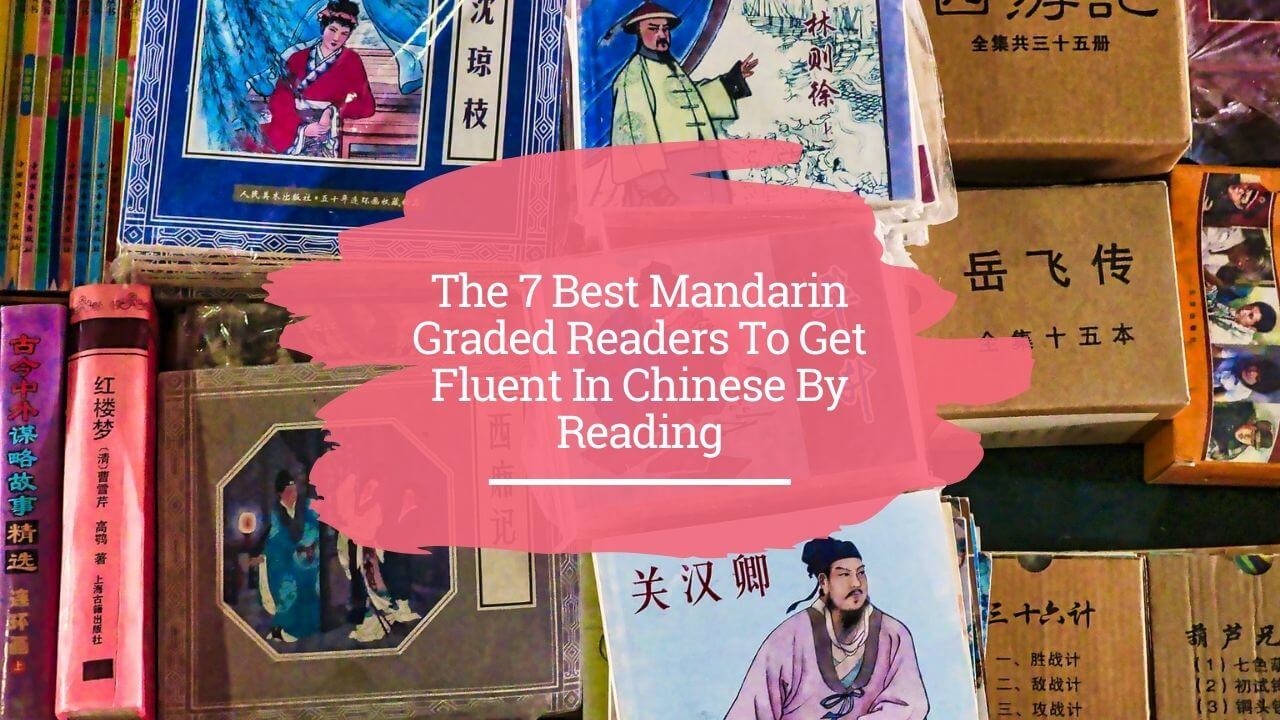Although learning Chinese can be tough, you're spoilt for choice when it comes to study materials to use, such as Mandarin readers.
But the quality varies. So to help you sort the wheat from the chaff, here are some suggestions that will get you reading confidently in Chinese as quickly as possible.
Pro Tip
By the way, if you want to learn Chinese fast and have fun, my top recommendation is Chinese Uncovered which teaches you through StoryLearning®.
With Chinese Uncovered you’ll use my unique StoryLearning® method to learn Chinese through story…not rules. It’s as fun as it is effective. If you’re ready to get started, click here for a 7-day FREE trial.
Table of Contents
Mandarin Reader: 7 Of The Best Options To Look Out For
Books
If you prefer a traditional book, there’s no shortage of options. And many are now also available in e-book format. Here are my recommendations for four series to look out for.
#1 Graded Chinese Readers
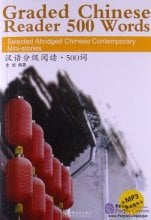
Publisher: Sinolingua
Levels: Upper beginner and above (HSK2-3+)
The Graded Chinese Readers series by Shi Jin is a collection of real Chinese stories that have been abridged for language learners.
The first book, ‘500’, contains 500 words suitable for HSK2-3. Each subsequent edition then increases the amount of vocabulary up to the highest level, ‘3000’.
Each page consists of alternating lines of Chinese characters and pinyin. And the books come with a handy tool to cover the pinyin while you read.
Difficult vocabulary is explained in notes in the margin. And each book also includes a recording.
These books are not suitable for complete beginners. But for those who are already a little more advanced, they offer fascinating insights into Chinese culture and provide a real flavour of Chinese life.
Unfortunately, the number of books in the series is limited. So once you’ve finished them, you’ll have to look elsewhere for more material to read.
- Pros: Authentic Chinese and interesting stories based on Chinese life and culture
- Cons: Limited number of titles
#2 Mandarin Companion

Publisher: Mind Spark Press
Levels: Upper beginner to intermediate
The Mandarin Companion series comprises three levels, Breakthrough, Level 1 and Level 2.
Breakthrough uses only around 150 different characters and is aimed at those who have been studying for six months to a year.
The next two levels are then suitable for learners progressing past the basics who are ready for more of a challenge.
Most of the books are based on famous stories like Sherlock Holmes or H.G. Wells’ Country of the Blind – but reimagined and set in China. The idea is that this familiarity may help you when reading in Chinese for the first time.
The books all feature attractive illustrations. And in addition, if you’re reading an e-book version, you’ll find hyperlinks to help you with the vocab.
The main downside is that there’s no material for more advanced learners. But if you're a beginner and keen to start reading in Chinese, this series is ideal.
- Pros: Accessible, familiar topics for English speakers, perfect for lower-level students, available in both simplified and traditional character versions
- Cons: No material for high-level learners
#3 Chinese Breeze
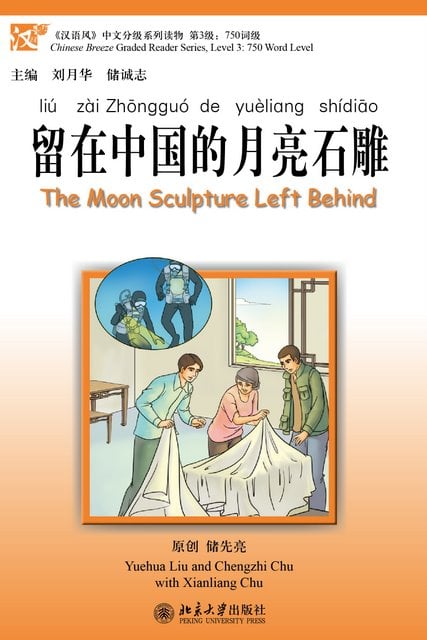
Publisher: Peking University Press
Levels: Lower intermediate to upper-intermediate/lower advanced
When it comes to a tried and tested concept like graded language readers, sometimes you just need to stick to the formula rather than trying to jazz it up too much.
And that’s the approach this Mandarin reader series has taken.
Books are available in four levels. So anyone from lower beginner to upper-intermediate or even lower advanced will find them useful.
There’s a good range of topics too, including several related to Chinese culture (unsurprisingly, since this series is published by Peking University). So you'll find them especially interesting if you want to learn more about China.
At the same time, there are plenty of other genres, like romance or horror. So just about anyone will be able to find something they enjoy.
However, the grammar and vocab explanations are more limited. So you’ll need to make sure you find the right level, or you may not be able to understand enough of what you’re reading.
- Pros: Good selection of topics, four different difficulty levels
- Cons: Limited grammar explanations
#4 Tales And Traditions

Publisher: Cheng & Tsui Company
Levels: Lower intermediate to advanced
For those who want to immerse themselves in the world of Chinese language and culture, the Tales and Traditions books are an obvious choice.
Although the first book in the series is intended for advanced beginners, this is probably a little ambitious.
In reality, the vocabulary is more suited to lower intermediate students.
The fourth book, on the other hand, is for high-level learners only and is aimed at those looking for something just a little below native level text.
In short, as long as you have the required level to manage these books, they’re an excellent choice for anyone interested in finding out more about Chinese culture and traditions at the same time as learning the language.
- Pros: Books focus on aspects of Chinese culture, challenging for higher-level learners
- Cons: Suggested levels slightly ambitious
Apps
Of course, if you prefer to make use of the technology in your pocket, you can also use Chinese smartphone apps for extensive reading. And while there are plenty of duds to avoid, here are two I can personally recommend.
#5 Du Chinese

Levels: All levels
Among the very best reading apps currently available is Du Chinese.
It boasts a huge collection of almost 2000 stories and texts. And more are being added all the time.
They are divided into six difficulty levels and cover a huge range of topics including culture, lifestyles, current affairs and more. So there’s something for everyone.
As well as giving you texts to read, the app also provides many useful features, such as the ability to turn pinyin on or off and a word bank where you can store and review the new words you encounter. You can also listen to the stories being read to get Chinese listening practice.
The only downside is that you need to pay a subscription. But if you’re serious about your Chinese, the price is very reasonable, making this an excellent resource to consider. There’s a free seven-day trial too, so you can try it before you commit.
- Pros: Easy to navigate and use, large number of stories, useful in-app tools
- Cons: Subscription required
#6 Maayot
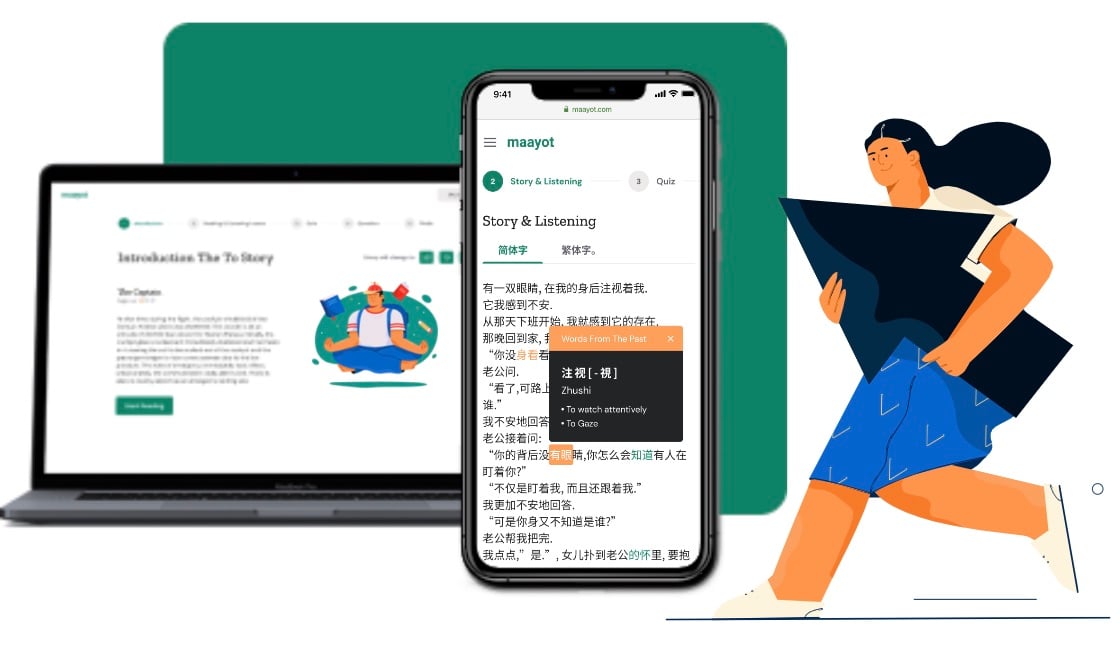
Levels: All levels
Another app to consider is Maayot, which, while more basic than Du Chinese, is well worth checking out.
Stories in this app are divided into three levels, Beginner, Intermediate and Advanced, and a new story appears for each level every day.
Each lesson starts with the reading part, and you can get information about words you’re not sure of just by tapping them.
New words are highlighted and explained. And a particularly handy feature highlights words you’ve learned before in a different colour, helping you remember them and making it easier to fix them in your long-term memory.
After reading, you then answer some comprehension questions. And you finish by writing a short composition at the end – and reading what other learners have written too.
As with Du Chinese, this app requires a subscription, although this one is slightly cheaper. The app offers a free story every Sunday. But since the subscription isn’t expensive, it’s another app that’s worth paying for if you’re serious about making progress in Chinese.
- Pros: Simple app doesn’t overcomplicate things, useful learning features
- Cons: Subscription required – although there’s a free story every Sunday
#7 Honourable Mention: Pleco
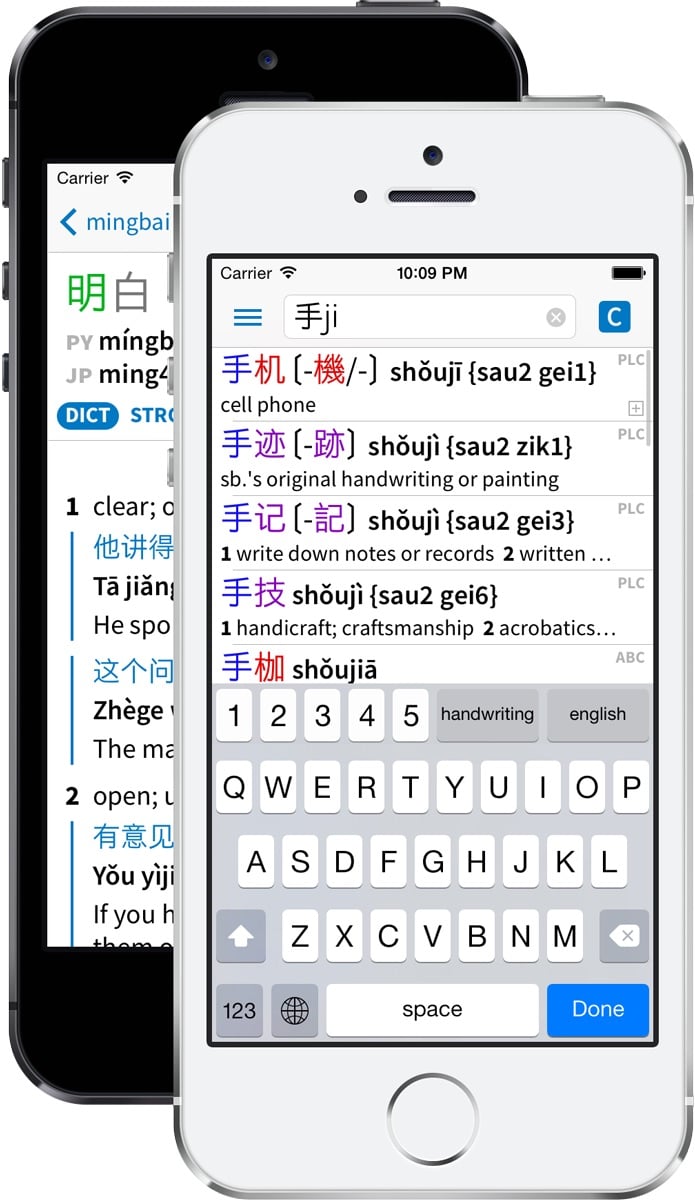
Although it didn’t make my main list, I’d like to give Pleco an honourable mention – since if you’re learning Chinese, you probably already have it on your phone.
Most people know Pleco as the leading Chinese dictionary app. But fewer people are aware that it also gives you access to a huge number of Chinese texts to read.
Simply click on the menu icon at the top left then go to “Add-ons” and then “Graded Readers” – and you will find a huge range of texts adapted for the familiar Pleco interface.
Most of them require a one-off payment, and the system is a bit more basic than dedicated apps like Maayot or Du Chinese. But since it’s probably already on your phone, it’s something that’s still worth a look!
Why You Should Read In Chinese And How

If you’re learning Chinese – or any other language – one of the best things you can do is read. That's why reading stories is the core of the StoryLearning® method.
However, I’m not talking about the kind of ‘intensive reading’ you might be familiar with from school where you study a short text to death, wringing every last drop of linguistic detail from the words.
Rather, I’m talking about ‘extensive reading’, reading longer texts for exposure to the language – as well as for the pleasure of reading itself.
The idea is to read as you do in your own language. You don’t need to understand every last grammar point, and you shouldn’t stop to check every new word in a dictionary.
Instead, if you don’t know a word, just try to guess it and move on. You should only look up a word if not knowing it prevents you from understanding the text as a whole.
This way, you come into contact with much more of the language. You will see how vocab and grammar work in context and will absorb everything in a much more intuitive and natural way.
Check out the rules of StoryLearning® for more details on how to make extensive reading work for you.
Why Use A Mandarin Reader?

Extensive reading is an incredibly powerful and often underrated technique, but for it to work, you need to build a regular reading habit.
Doing it at least three or four times a week is ideal. But reading only once a month won’t produce anything like the same results.
So why Chinese graded readers? Well, simply because as a learner, you don’t yet have the level to just pick up a book written for native speakers and start reading. You won’t understand enough of the text, so you’ll quickly become bored or disheartened and give up.
In addition, since Chinese is written in characters, this presents an extra problem – because, unlike with languages that use alphabets, if you don’t know a character, you won’t be able to read it at all.
Chinese graded readers solve both these problems by providing material that is at just the right level for you. And using mostly characters you already know.
This way, even with a language like Chinese, you can begin reading right away and start enjoying all the benefits that extensive reading will bring.
What To Look For In A Mandarin Reader

Choosing the right material is essential for extensive reading, so what should you look for in a Mandarin reader?
First, you should find a reader that’s the right level for your ability. For extensive reading, you should understand most of what you read – probably in the region of 80% or higher.
It shouldn’t be too easy, or you won’t learn anything. But you should be able to understand most of what’s going on despite a few unfamiliar words.
Next, you should look for something you actually want to read because extensive reading should be fun. Enjoying your reading will help you develop a habit, and it will also help keep you motivated.
Good graded readers usually give you help with new vocabulary. And if you’re using a mobile app, it should also be easy to navigate and offer useful features. Avoid apps that are too gimmicky but light on useful functions.
Finally, having a recording is always helpful. This way, you can listen to the text before or after reading, which will also give your listening skills a boost.
Mandarin Reader FAQ
Is there an app that reads Chinese?
Yes, there are several apps that can read Chinese characters and translate them into other languages. Google Translate and Pleco are popular options.
Google Translate allows you to use the camera to scan and translate text in real-time, while Pleco is a dedicated Chinese dictionary app with a powerful Optical Character Recognition (OCR) feature for reading Chinese text.
What is the best Mandarin translator?
Pleco and Google Translate are two of the best options for translating Mandarin.
Pleco is especially useful for learners as it offers detailed explanations, pronunciation help, and example sentences.
Google Translate is great for quick translations, with a camera feature for reading printed Chinese characters.
Is it difficult to read Mandarin?
Reading Mandarin can be challenging for beginners, as it uses thousands of unique characters instead of an alphabet.
However, learning basic characters and radicals (the components of characters) helps simplify the process.
With regular practice, many learners can start recognising and reading common Mandarin characters.
What are the best Mandarin graded readers for Chinese learners?
Here are seven of the best Mandarin readers to immerse yourself in Chinese by reading.
1. Graded Chinese Readers
Publisher: Sinolingua
Levels: Upper beginner and above (HSK2-3+)
2. Mandarin Companion
Publisher: Mind Spark Press
Levels: Upper beginner to intermediate
3. Chinese Breeze
Publisher: Peking University Press
Levels: Lower intermediate to upper-intermediate/lower advanced
4. Tales and Traditions
Publisher: Cheng & Tsui Company
Levels: Lower intermediate to advanced
5. Du Chinese, Chinese reading app
Levels: All levels
6. Maayot, Chinese reading app
Levels: All levels
7. Pleco, Chinese dictionary app that also has stories available
Mandarin Reader: Check Some Out & See Which Ones Suit You

Not every Mandarin reader will suit every learner, so the best advice is to try a few and see which you like.
If you can, go into an old-fashioned book shop and look for some of the titles I’ve mentioned. Or if you decide apps are the way to go, most give you the option of a free trial, so you can see what works for you that way.
In any case, with extensive reading and graded readers, your goal is to build a consistent reading habit so you practise at least several times a week. Then, once you do that, you will be amazed by how fast your overall Chinese ability begins to improve.

Olly Richards
Creator of the StoryLearning® Method
Olly Richards is a renowned polyglot and language learning expert with over 15 years of experience teaching millions through his innovative StoryLearning® method. He is the creator of StoryLearning, one of the world's largest language learning blogs with 500,000+ monthly readers.
Olly has authored 30+ language learning books and courses, including the bestselling "Short Stories" series published by Teach Yourself.
When not developing new teaching methods, Richards practices what he preaches—he speaks 8 languages fluently and continues learning new ones through his own methodology.
